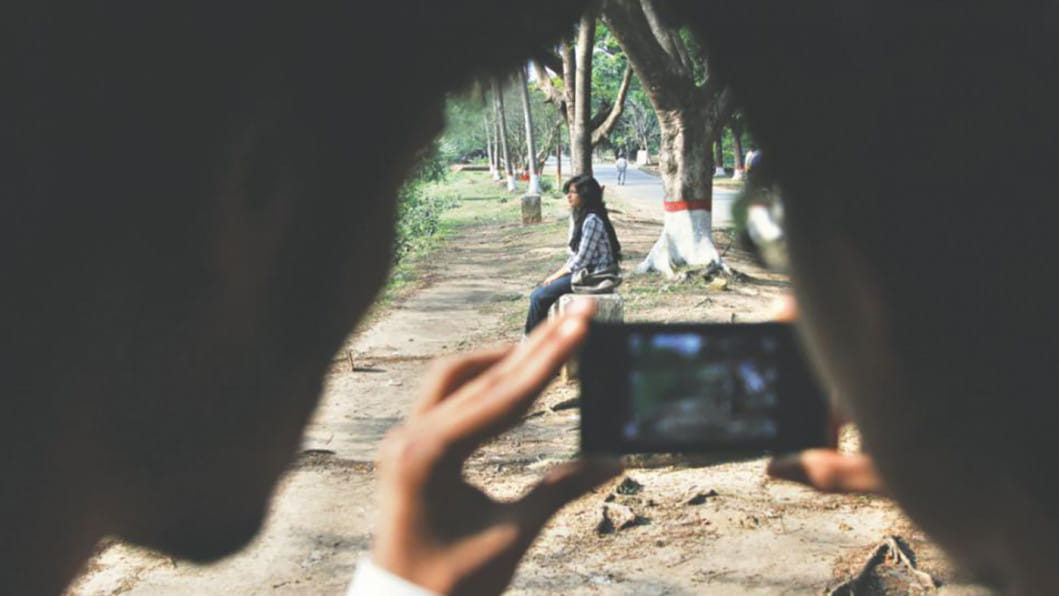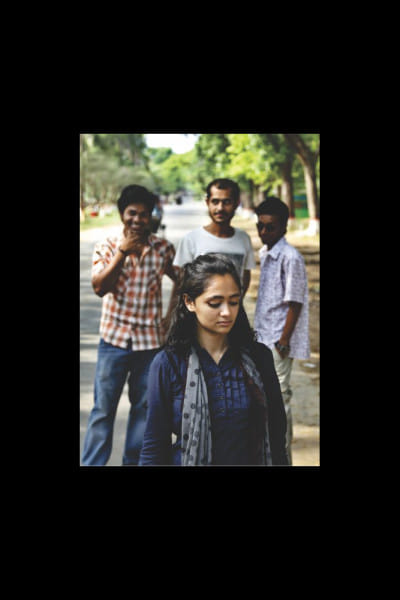Stalking victims being failed

In July 2017 alone, 22 females were stalked, one of whom committed suicide due to stalker harassment. A further 14 people were collateral damage for protesting stalking of the victims, of whom two men were killed and 11 people injured. Though females overwhelmingly constitute targets of stalking and sexual harassment, male family members and relatives protesting often too suffer violence at the hands of stalkers.
In a widely publicised case in August of last year, Suraiya Akhter Risha, an eighth grader at Willes Little Flower School and College in Kakrail of the capital, was stabbed by her stalker on a footbridge near her school on her way home. According to her mother, Obaidul Khan had stalked her over the phone three months before the stabbing. Khan had access to her number from the tailoring shop where he worked and where Risha was a customer.
According to state machinery, Risha could have lodged a general diary with the police, which should ideally have led to an investigation into Khan, and potentially saved Risha's life. Officer-in-charge (OC) of Ramna police station, Moshiur Rahman, says that a GD had not been lodged earlier.
What prevents victims like Risha—and Sonia from Brahmanbaria who was stabbed in July by her stalker—from complaining to the police?
To begin with, there is no logistical support to investigate these cases at the thana, and such complaints (if a GD is lodged) are referred to the Dhaka Metropolitan Police (DMP) cyber crimes unit for investigation, according to OC Rahman.
Limitations of the police
Lodging a GD entails the victim writing a complaint in the GD book at the local thana. A GD can be lodged for anything from a lost wallet to stalker harassment. It is an entry of every complaint brought to the thana.
However, a GD being lodged does not necessarily mean that the complaint has been investigated. “We only investigate if the complaint is serious. Many complaints are lodged with us regarding cases of domestic disputes, for example, which are of a personal nature, and so do not warrant a police investigation,” says OC Rahman.
If the investigation of a GD yields evidence of harassment or violence, a case is then filed against the perpetrator(s) and they are arrested by the police. Until then, victims of stalking are still at risk. Police protection, however, is not an option. “It is not possible to provide individual protection to all those who request it, except for VIPs,” says OC Rahman.
There are no records kept at police headquarters of the number of GDs lodged across all thanas each week or each month or over a year. Around 20 to 30 GDs are lodged at Shahbag police station every day, which has a staff of 70 officers to handle these. “Response time [to GDs] varies case-by-case,” says Abul Hasan, OC of Shahbag police station.

According to Assistant Inspector General (AIG) Sahely Ferdous at Bangladesh police headquarters, normal response time to the lodging of a GD is 24 hours. An investigation, however, is often delayed by more than this time due to the demands of many GDs, duty for VIPs, and other operational demands at each thana across the country. “Exceptions are made in case of emergencies, to investigate serious GDs timely,” says AIG Ferdous.
This was not, however, the case for a garment worker who sought to lodge a GD at the Banani police station in March of this year against four youths who had harassed her. She requested assistance for five hours and was made to pay BDT 300 before the GD was lodged by the police.
Worried for her safety on her way home to Korail from the police station late at night, she was denied a police escort. The following day, she was raped by the same men who had harassed her earlier and who had received word of the GD lodged against them. This was a case of police negligence starting from the OC of the station himself, who, the rape survivor claimed, subsequently refused to file her rape case.
As the case above illustrates, even a matter of 24 hours can have life and death consequences for victims of stalking and sexual harassment. That is, if the police investigate at all. This is on top of the fact that the victim had to also pay a bribe to try and ensure her safety.
Women are also reluctant to go to the police for fear of relating experiences of sexual harassment to mainly male policemen and the not-unlikely possibility of being further harassed there. An ActionAid Bangladesh study on safety in public spaces in four major cities last year found that 30 percent of women experienced sexual harassment and 35 percent faced what they considered physical torture at police stations.
“In many cases, perpetrators are locally influential so victims and their families are discouraged from reporting such cases to the police,” says Fahmina Taskin, a gender expert at Odhikar.
Police limitations aside, inaction by the police when GDs are lodged beforehand is worrying and can deter victims of stalking from coming forward.

 For all latest news, follow The Daily Star's Google News channel.
For all latest news, follow The Daily Star's Google News channel. 



Comments